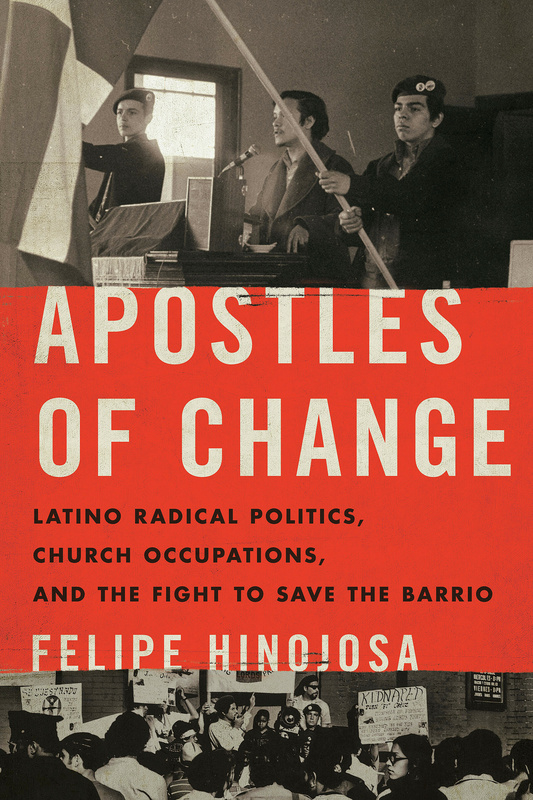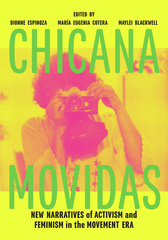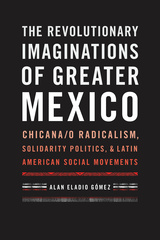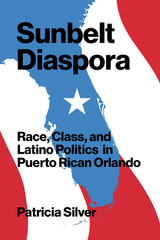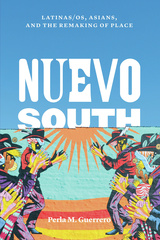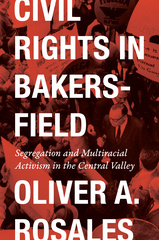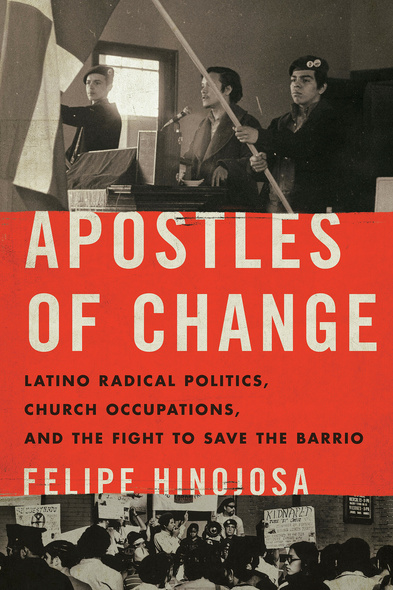
Apostles of Change
Latino Radical Politics, Church Occupations, and the Fight to Save the Barrio
2021 Finalist Raul Yzaguirre Best Political/Current Affairs Book, International Latino Book Awards
Winner of the Texas Association of Chicanos in Higher Education Inaugural Book Award
Unraveling the intertwined histories of Latino radicalism and religion in urban America, this book examines how Latino activists transformed churches into staging grounds for protest against urban renewal and displacement.
In the late 1960s, the American city found itself in steep decline. An urban crisis fueled by federal policy wreaked destruction and displacement on poor and working-class families. The urban drama included religious institutions, themselves undergoing fundamental change, that debated whether to stay in the city or move to the suburbs. Against the backdrop of the Black and Brown Power movements, which challenged economic inequality and white supremacy, young Latino radicals began occupying churches and disrupting services to compel church communities to join their protests against urban renewal, poverty, police brutality, and racism.
Apostles of Change tells the story of these occupations and establishes their context within the urban crisis; relates the tensions they created; and articulates the activists' bold, new vision for the church and the world. Through case studies from Chicago, Los Angeles, New York City, and Houston, Felipe Hinojosa reveals how Latino freedom movements frequently crossed boundaries between faith and politics and argues that understanding the history of these radical politics is essential to understanding the dynamic changes in Latino religious groups from the late 1960s to the early 1980s.
Hinojosa does an excellent job of showing the importance of religious spaces to Latina/o justice movements in the late 1960s and early 1970s—a reality that has often been overlooked by historians…[Apostles of Change] is important for anyone interested in social movements, Latina/o history, and urban studies. The case studies also offer wisdom that community workers and activists might draw on for their work.
Written in clear and engaging prose, Hinojosa’s Apostles of Change is an important work that teaches us that people can be agents in the creation of a brighter future for themselves and their community. This work is well researched and will only become more influential in years to come, particularly in the fields of Latino religious studies, Latino Civil Rights, as well as Mexican American history.
In the late 1960s and early ’70s, Latino activists occupied church buildings across the country as a way of taking back control of their communities and calling attention to local residents’ poverty, lack of educational opportunities and displacement amid revitalization plans that hiked up rents...Hinojosa gives this little remembered movement a new look.
[Apostles of Change] highlights the organizing of community members, organizers, and activists as they transformed churches into staging grounds to challenge poverty, racism, urban renewal, and police brutality...In redefining the politics of faith, Hinojosa analyzes the histories of organizing from spaces of occupation to spaces of sanctuary within churches. Apostles of Change is a vital addition to the research on social movements within religious studies, Chicana/o/x studies, and Latina/o/x studies.
Apostles of Change accomplishes Hinojosa’s goals of providing a religious history of 'Latina/o freedom movements,' and a social movement history of religion...Apostles of Change is a welcomed contribution to the literature on Latina/o political movements for its utilization of religion and urban history as frameworks of analysis. Scholars of social movements, urban history, and religion will find Hinojosa’s study imperative for understanding how grassroots activists challenged gentrification, discrimination, and power that connects the stories in the book to present obstacles facing Latina/os.
In fifty years of incredible productivity in Chicano history, surprisingly few studies of religious history were written. One of the exciting new changes in this historiography is the increased study of religion, especially the link between religion and community activism. A new generation of historians is leading the way, and Felipe Hinojosa is a key member of this vanguard...In successfully resurrecting these histories, Hinojosa has written a significant addition to the growing historiography of Chicano/Latino religious history. Well-written and organized, it should be welcomed by historians of the Chicano/Latino experience and by those interested in American religions.
Hinojosa takes seriously both the religiosity of seemingly secular activists and the politics of organized religion; at the nexus, he charts a new Latina/o religious history that took its cues directly from the streets...Hinojosa's occupiers offered radical visions for their community's liberation, breathed new life into their barrios, and remade their spiritual universes in both theological and practical terms. They were true apostles of change. Hinojosa's account of their exploits is a must-read for historians of social movements, religion, and working-class studies alike.
A revolutionary contribution to Latinx church history in the United States...Apostles of Change is an expertly crafted text that integrates first-hand testimony, archive, and historical sources to present this lesser-known side of Latinx activism in American history.
Apostles of Change is expertly researched and written—a tribute to 'short but fertile' moments that bring religion to the forefront of Latinx social movements.
Hinojosa provides an in-depth understanding of how faith-based politics and social movements—rooted in religious institutions and neighborhoods across the nation—became central to civil rights activism, self-determination, and neighborhood empowerment...Apostles of Change is a welcome addition to the fields of civil rights history, religious history, and urban history...Hinojosa’s excellent study leaves the reader wanting to know more about how these occupations affected other cities in their regions. Indeed, he has set a foundation for future scholars to build on with this wealth of knowledge of occupations, movements, and activism.
Apostles of Change is a game-changer in how we view U.S. Latina/o history. In this meticulously crafted and researched book, the author urges his reader to move beyond the single-origin narratives that historians tend to embrace and retell about movements, in favor of a more complex, multi-layered story...Apostles of Change is a must-read for anyone interested in U.S. Latina/o history and in how Latinas and Latinos worked to raise awareness of the entanglements of racism, white privilege, and institutional churches’ complicity in perpetuating broken systems...I am grateful to the author for his revisionist work that is essential reading for anyone interested in U.S. history.
In-depth consideration of local struggles and local coalitions, including across racial/ethnic groups...melding of archival and oral history methods.
Overwhelmingly readable, Apostles of Change is a counternarrative to the argument that religious politics in the United States became universally more conservative in the 1970s. Focusing on the 'outsiders' as much as the 'insiders,' Hinojosa demonstrates how the 'sacred' was actually part and parcel of the 1960s social movements.
Felipe Hinojosa offers a textured narrative of urban Chicanx and Puerto Rican activism, comprising a treasure trove of rich detail and fascinating stories. Apostles of Change is an important and well-researched book, brimming with the ideas and voices of the Latinx activists that fill its pages.
Felipe Hinojosa is an associate professor of history at Texas A&M University and the author of Latino Mennonites: Civil Rights, Faith, and Evangelical Culture. His work has appeared in Zócalo Public Square, Western Historical Quarterly, American Catholic Studies, and Mennonite Quarterly Review and in edited collections on Latinx studies.
- Preface
- Acknowledgments
- Abbreviations
- Introduction: The People’s Church
- 1. Thunder in Chicago’s Lincoln Park
- 2. “People—Yes, Cathedrals—No!” in Los Angeles
- 3. The People’s Church in East Harlem
- 4. Magic in Houston’s Northside Barrio
- Conclusion: When History Dreams
- Notes
- Bibliography
- Index

